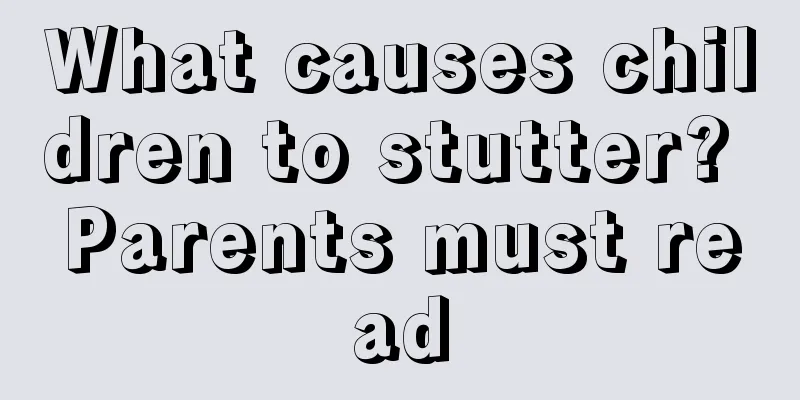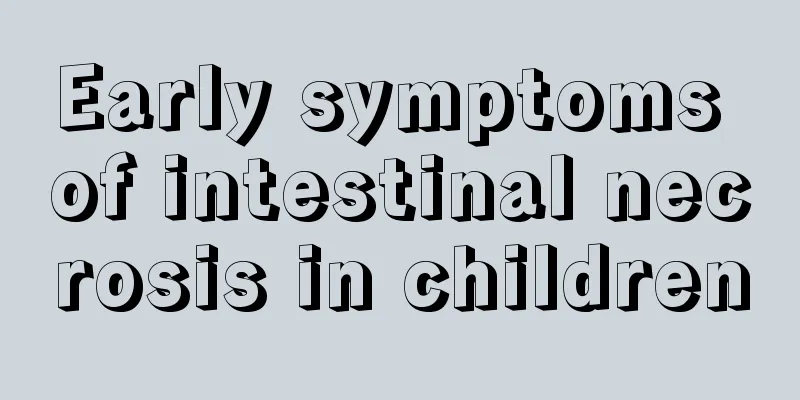What causes children to stutter? Parents must read

|
If a child's stuttering is not corrected in time, it will affect their future speech and social interactions. Stuttering in children may also be caused by some mental factors, such as long-term mental depression or tension. 1. Stuttering often occurs around the age of 2 to 5. This is the stage when children's language and psychology develop most rapidly. Children's interest in the surroundings gradually expands and their vocabulary becomes richer. However, because the speech function is still immature, they are not good at choosing words and the sounds are not connected fluently. Therefore, their speech sometimes appears hesitant and repetitive. This is a natural phenomenon of growth and development and will gradually disappear as children grow older. Stuttering caused by mental factors and poor living conditions is a special neurological disease. Sudden mental factors, such as being frightened, sudden changes in environment, death of parents, severe punishment, etc., and longer-term mental factors, such as separation from parents, can all cause stuttering. Sudden and intense sound stimulation is often the cause of stuttering in young children. Alternatively, it can be caused by imitating other people who stutter. After whooping cough, influenza, measles, scarlet fever or brain trauma, the brain's functional activity is weakened, which can easily lead to excessive tension and stuttering, which can eventually become a habit. Stuttering is common in children who are debilitated or particularly excitable. 2. The basic symptom of stuttering is spasm of the muscles of the speech apparatus. In addition to stuttering, there are other neurotic phenomena: excitability, emotional instability, irritability, timidity, sleep disorders, fear or other emotional reactions, enuresis, loss of appetite, etc. After school-age children enter school, their speech activities increase greatly. Due to the ridicule of people around them and the inability to answer learning questions well, children feel distressed by their speech defects, which aggravates their anxiety and neurotic symptoms or they adopt a passive avoidant attitude, such as children being afraid to speak. Older children dare not participate in more social activities and become lonely, shy, hesitant, and inferior. 3. The treatment of stuttering in young children must start as early as possible, because stuttering can be consolidated according to the mechanism of "conditional connection". The more consolidated the "pathological conditional connection" is, the slower it will disappear. When treating stuttering, the first thing to do is to eliminate negative factors in the environment, such as imitation and ridicule from people around you. Do not draw undue attention of people around you to the child's defects. When the sick child is present, do not talk about his or her illness to relieve the child's tension. Parents should actively encourage their children to practice, and support and guide them to overcome stuttering. During the period of severe stuttering, keep the child quiet, do not force him to speak, and do not urge him to repeat himself clearly. 4. Guide children in speech training, using a simple question-and-answer method. Slow down the speech speed, make the child's breathing gradually normal when speaking, and reduce stuttering. Adults should speak calmly, slowly and clearly to children. For older children, teach them directly to speak and read slowly and rhythmically. At the same time, the nature of stuttering should be explained to the child, and all methods should be used to comfort and encourage the child, increase his or her confidence, and reduce the mental stress caused by speech. 5. In terms of medication, you can use a small dose of olfactory agent, or 5-10 mg of chlordiazepoxide, 1-2 times a day to reduce muscle and respiratory tension and increase training effects. However, the medication should be used under the guidance of a doctor. For children who stutter, in addition to intensive training, acupuncture treatment can be used in combination. |
<<: How to treat sleepwalking in children? Notice to Parents
>>: How to deal with eye discharge in children, mothers need to read
Recommend
What should I do if my newborn baby has not had a bowel movement for two days?
Metabolism in daily life usually represents some ...
Can children's growing pains be relieved by soaking their feet more often?
Growing pains can be said to be a problem that ch...
Can children grow taller by drinking milk?
Many parents are worried that their children will...
What to do if your 15-day-old baby gets angry
For a 15-day-old baby, the physical fitness is ve...
Why does a child cry when he dreams while sleeping?
Many children suddenly cry when they are sleeping...
What happens if a one-year-old baby doesn't eat well?
Many babies have started to eat normally by the t...
What to do if your child has thinning hair
Children's every move is what parents are mos...
What causes asthma and bronchitis in children?
In the pediatric outpatient clinic, some children...
Treatment for red eyelids in babies
Children's skin is very fragile, and frequent...
What is cryptorchidism in children?
As a parent of a baby boy, you must be alert to a...
Do you know how to solve the problem of missing teeth in children?
Dental health is very important to everyone. If a...
Can a two-year-old baby drink pure milk?
Can two-year-old babies drink milk? This is a que...
What to prepare for the one-year-old lottery
It is a traditional custom in China to let one-ye...
What causes convulsions in children?
What is Jingzhe? In fact, the occurrence of cervi...
Why is my eight-month-old baby restless when sleeping at night?
If you don't sleep well at night, the harm ca...









